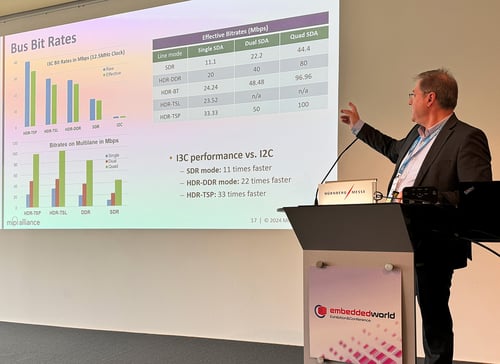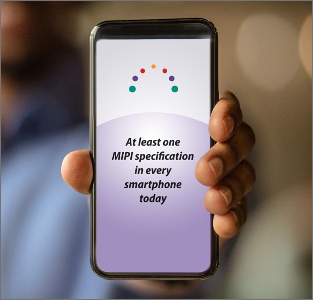MIPI UniPro®
MIPI Unified Protocol Specification
.jpg?width=1800&height=900&name=Banner%20Images%20-%20MIPI%20(1).jpg)
Developed by: UniPro Working Group
An application-agnostic transport layer for chip-to-chip/interprocessor communication (IPC) applications in traditional or modular device architectures
Quick Facts
-
Use Cases
- Flash storage
- Networking components
- Modular designs
- Automotive systems
- Edge AI
-
Used In
- Smartphones
- Tablets
- Mobile computing devices
- Mobile gaming devices
- Automotive infotainment systems
- Automotive telematic hubs
-
Adopted By
- JEDEC UFS
-
Physical Layer
MIPI M-PHY®
Industries
Get the Specification
-
Current Version
MIPI UniPro® v3.0 (November 2025)
Member version -
Conformance Test Suites & App Notes
-
Previous Versions
All UniPro versions are available to MIPI members on the member website (Causeway).
Overview
MIPI UniPro® is an application-agnostic transport and link layer that is used to interconnect chipsets and peripheral components. Because of its versatility, UniPro has been adopted for traditional and innovative applications in varied industries. For example, UniPro has been incorporated into multiple versions of the JEDEC’s Universal Flash Storage (UFS) standard as its transport and link layers, along with MIPI M-PHY® serving as its physical layer.
MIPI UniPro is developed by the MIPI UniPro Working Group and was first released in 2007. The current version, v3.0, was adopted in 2025. The full specification is available only to MIPI Alliance members. For information about joining MIPI Alliance, visit Join MIPI.
Fundamental Features
- High performance
- Low power
- Low EMI
Performance Highlights
MIPI UniPro functions as a processing pipeline for data units. It is structured as a protocol stack, similar to layers 1-4 in an Open Systems Interconnection (OSI) reference model. The interface is easy to deploy and flexible for use in traditional and modular device architectures. It can be used as a standalone interface for chip-to-chip/IPC communications and as a building block for multimedia interfaces. Devices that use MIPI UniPro include smartphones, tablets and mobile computing products, as well as infotainment platforms and telematics hubs in automotive systems.
UniPro provides quality of service (QoS) features, such as dynamic link updates and link training, to ensure components interconnected with the technology operate as intended at higher speeds. The QoS features are important for ensuring the reliability of data transmissions in systems that are subject to highly variable and potentially extreme temperature conditions, such as automobiles. The QoS features can also be used in any application to monitor and address performance issues associated with aging interconnects to help extend the lifespan of deployed systems.
Current Version
The latest release of UniPro, version 3.0, further enhances the specification to support forthcoming updates to MIPI M-PHY and JEDEC Universal Flash Storage (UFS).
UniPro v3.0 supports a new high-speed mode, with data speeds of up to 46.6 Gbps per lane, per direction, based on the forthcoming M-PHY v6.0 high speed gear 6 (HS-G6). To support this new capability, v3.0 introduces a :1b1b line encoding scheme that will reduce signaling overheads by up to 20% compared to the existing 8b10b scheme. New scrambling, block coding, lane alignment, gray coding, and precoding features are added to support the new 1b1b encoding scheme, as well as new forward error correction (RS-FEC) and 64-bit cyclic redundancy check (CRC) (in 1b1b mode) features, which will enable HS-G6 links to operate with a bit-error-rate (BER) of 10-6.
UniPro v3.0 deprecate several lesser used features to reduce complexity, such as FastAuto_Mode, and Low Speed Mode. The Link Up Low Speed feature has been made optional, link training (equalization) added and CreditMode128 mandated. The specification is backward compatible with UniPro v2.0.
Features in v2.0
MIPI UniPro v2.0 introduced additional capabilities for high-speed serial communication interfaces and support for simultaneous, high-bandwidth transactions:
- Uses M-PHY v5.0's “High Speed Gear 5” (HS-G5) to increase bandwidth to 23.32 Gigabits per second (Gbps) per lane and per direction to satisfy the ecosystem’s growing data rate requirements
- Boosts the specification’s L2 layer packet payload length from 272 to 1144, decreasing protocol overhead, increasing link speed and resulting in improved throughput for storage applications
- Decreases latency in completing a link (or “stack boot”) in storage applications by up to about 8 milliseconds
JEDEC’s UFS 4.0 standard takes advantage of these enhancements, as well as those in M-PHY v5.0.
UniPro v2.0 also simplified integration for application designers by removing features such as lower speed modes that largely have fallen out of use among the flash storage industry. Even with the elimination of those features, UniPro v2.0 remains compatible with the previous version, v1.8. The specification’s conformance test suite (CTS) has been updated to account for the new features in v2.0.






